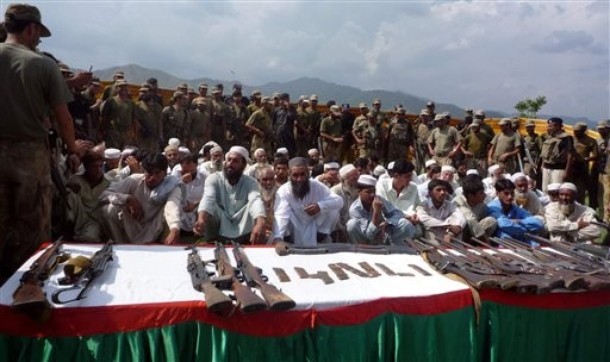
In 2006, a friend of mine took me to Abbottabad, which falls on the Karakorran highway, and introduced it as a city of oranges while driving from Islamabad to earthquake impacted areas of Khyber Pakhtunkhwa and Muzaffarabad district of Pakistan-administered Jammu and Kashmir.
Abbottabad, which was the final abode of the world’s most wanted man, Osama Bin Laden, falls in the Hindku speaking Hazara region what was until recently known as the North West Frontier Province. It falls on the route to Northern Areas as well as Muzaffarabad and Neelum districts of Pakistan-administered Jammu and Kashmir. Ayub Khan, the Pakistani president who founded Islamabad as the capital, came from Hazara belt.
It is important to distinguish the Pashtun belt from Hindku speaking belt of Kyber Pakhtunkhwa. In fact, the ethnic polarization between two cultural groups was the prime reason that it was difficult for decades to find a consensual name for North West Frontier Province which satisfied the two ethnic communities. The Hindku speaking area is culturally more akin to adjoining Punjab province or even the Pothwari speaking area of Pakistan-administered Jammu and Kashmir than to Pashtun belt.
Osama’s killing at Abbottabad also provides sufficient ground for the Americans to revise their Pashtun centric approach in the region. The entire American policy on the region is primarily obsessed with the Pashtun belt and thereby expending its soft and hard power in the region for the last decade. America’s present policy impulse is driven by the guilt that they abandoned the Pashtuns after the defeat of the Soviets which brought the Taliban to power.
The real challenge to meet the threat of terrorism to the outside world emanating from Pakistan for various reasons will be in Punjab province and its culturally akin Pakistan administered Jammu and Kashmir and not from Taliban present in Pashtun belt. Khalid Sheikh Mohammad, the prized catch whose arrest led to the killing of Osama Bin Laden, was arrested in Rawalpindi district of Punjab province of Pakistan. Omar Sheikh, a British Pakistani citizen who was involved in Daniel Pearl’s killing, was arrested in Lahore area of Punjab province. 7/7 bombings in London were carried out by members of diaspora from Pakistan-administered Jammu and Kashmir. Even the foiled Heathrow bombings in 2006 was the handiwork of members of diaspora, which was masterminded by Rashid Rauf, another British Pakistani, who had his ancestral roots in Mirpur area of Pakistan-administered Jammu and Kashmir.
The infamous case of Omar Sheikh, British citizen of Pakistani ethnicity, is another example of this pattern. Ilyas Kashmiri, a resident of Kotli district of Pakistan-administered Jammu and Kashmir and a veteran of Kashmir jihad, is another Al-Qaeda commander. Bin Laden spent more time in Hindku speaking part of Pakistan than in Afghanistan or even the Pashtun belt of Pakistan after 9/11. There were hardly any organized protests against the killing of Osama Bin Laden in other parts of Pakistan including the Pashtun belt except organized by Hafiz Saeed led Jamaat-ud-Dawa in Lahore.
It is Punjab province of Pakistan and Pakistan-administered Jammu and Kashmir which is strongly integrated with the rest of the world, which can provide vital access to the extremists to attack soft targets outside Pakistan. For instance, the vast majority of Britain’s 1.6 million Muslims (around one million, two-thirds of whom are from Pakistan, less than one-third from Bangladesh and the remainder from India) is from Pakistan-administered Jammu and Kashmir.
The understanding of myriad political factors causing extremism among youth of Punjab province and neighbouring Pakistan-administered Jammu Kashmir will be important to formulate a policy which prevents sanctuaries for extremists in the region.
American policy’s ignorance to some of the recent trends in Pakistan will be at its own peril.
Luv Puri is a political analyst, who has written two books on South Asian political and security issues. His latest book "Across the LOC," is based on field work in Pakistan and Pakistan-administered Kashmir.
Image: pakistan-glimmer-hope.jpg
